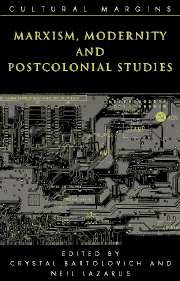Book contents
- Frontmatter
- Contents
- 1 Introduction: Marxism, modernity and postcolonial studies
- Part I Eurocentrism, “the West,” and the world
- Part II Locating modernity
- Part III Marxism, postcolonial studies, and “theory”
- 10 Postcolonial studies between the European wars: an intellectual history
- 11 Marxism, postcolonialism, and The Eighteenth Brumaire
- 12 Postcolonialism and the problematic of uneven development
- 13 Adorno, authenticity, critique
- References
- Index
10 - Postcolonial studies between the European wars: an intellectual history
Published online by Cambridge University Press: 22 September 2009
- Frontmatter
- Contents
- 1 Introduction: Marxism, modernity and postcolonial studies
- Part I Eurocentrism, “the West,” and the world
- Part II Locating modernity
- Part III Marxism, postcolonial studies, and “theory”
- 10 Postcolonial studies between the European wars: an intellectual history
- 11 Marxism, postcolonialism, and The Eighteenth Brumaire
- 12 Postcolonialism and the problematic of uneven development
- 13 Adorno, authenticity, critique
- References
- Index
Summary
Postcolonial studies entered the academy in the mid-1980s as a form of theory, when theory was still an embattled enclave on its way to becoming a large and dominant space. To the profession at large, postcolonial studies simply was literary theory in one of its specialized institutional forms, and (more to the point) this was also how scholars wanting to break into the field saw it (Hulme 1989, Spivak 1988, Marrouchi 1997). To speak of the conflation of postcolonial studies and literary or cultural theory in this way is, of course, to speak phenomenologically – that is, to speak of a perception that acquires the status of truth within a bracketed reality. For seen in retrospect, postcolonial studies obviously offered any number of archival, or polemical, or expository projects from the very beginning, not only theoretical ones – especially in the disciplines of history and anthropology where ideational discourse has always arrived rather late and tentatively.
And yet, from the mid-1980s onwards, academic audiences took postcolonial studies to be an adjunct of the same intellectual concerns that had rudely entered their domains only a handful of years earlier in the form of genealogical displacements, psychoanalytic treatments of the subject, analyses of discursive power, and programmatic demands for decentering.
- Type
- Chapter
- Information
- Marxism, Modernity and Postcolonial Studies , pp. 185 - 203Publisher: Cambridge University PressPrint publication year: 2002
- 6
- Cited by

